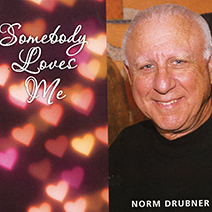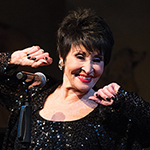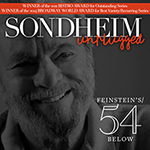Norm Drubner
Somebody Loves Me
November 30, 2017
Reviewed by John Hoglund for Cabaret Scenes
 Norm Drubner did it again. With the release of his eighth CD, Somebody Loves Me, he offers a classy collection of vintage cuts from another place in time as he spans the decades. The album is a respective homage to crooners of yesteryear. He is a minimalist with a grainy, lived-in baritone that is never less than heartfelt with even-paced, jazzy arrangements by keyboardist Nick Bariluk that bring out the interior lives of this well-chosen set of songs.
Norm Drubner did it again. With the release of his eighth CD, Somebody Loves Me, he offers a classy collection of vintage cuts from another place in time as he spans the decades. The album is a respective homage to crooners of yesteryear. He is a minimalist with a grainy, lived-in baritone that is never less than heartfelt with even-paced, jazzy arrangements by keyboardist Nick Bariluk that bring out the interior lives of this well-chosen set of songs.
Like a seasoned saloon singer you might have found in the 1950s at closing hour in a dusty piano lounge, Drubner knows his strengths. As a result, the best thing about this album is that it’s simply real. No frills. The fact that Drubner, a successful attorney and real estate broker in Connecticut, understands who he is gives the CD a certain heft in a laid back delivery that recalls Perry Como’s easy style.
As in the past, he knows how to sell these oldies in a compelling style that is easy to listen to. He whispers words of love and yearning with placid ease juxtaposed against Bariluk’s refined arrangements that just glide.
Some sweet highlights include the perky title cut by George Gershwin with lyrics by Ballard MacDonald and Buddy DeSylva (from 1924). “My Foolish Heart” (Victor Young and Ned Washington) is effective with a light, music-box accompaniment giving this evergreen a new spin that is refreshing.
Cole Porter’s “Ev’ry Time We Say Goodbye” (1944) has a smooth delivery that pulls you in, featuring a dynamite trumpet wail by Tony Kadleck. Ray Noble’s rarely heard “The Touch of Your Lips” from 1936 (recorded by Tony Bennett and Vic Damone, etc.) is a stylized entry that clicks and is a welcome delight.
He wraps it all up with “Make Someone Happy” (1960) with music by Jule Sytne and lyrics by Betty Comden and Adolph Green from the 1960 musical Do Re Mi. Generally, Drubner’s vocals rely heavily on understatement. With the exceptional musicians supporting him, he meets the challenge of these chestnuts once sung by all the greats. In the end, what he lacks in experience and pizzazz, he makes up for in commitment and sensitivity. His standards are invigorated with a benign passion. And that counts for everything in an age of blandness.
Aside from the mastery of Bariluk and Kadleck, other great musicians include Gary Keller (saxophone and clarinet), Bob Leonard (drums), Arthur Lipner (vibraphone), Henry Lugo (bass), and Chris Morrison (guitar).





